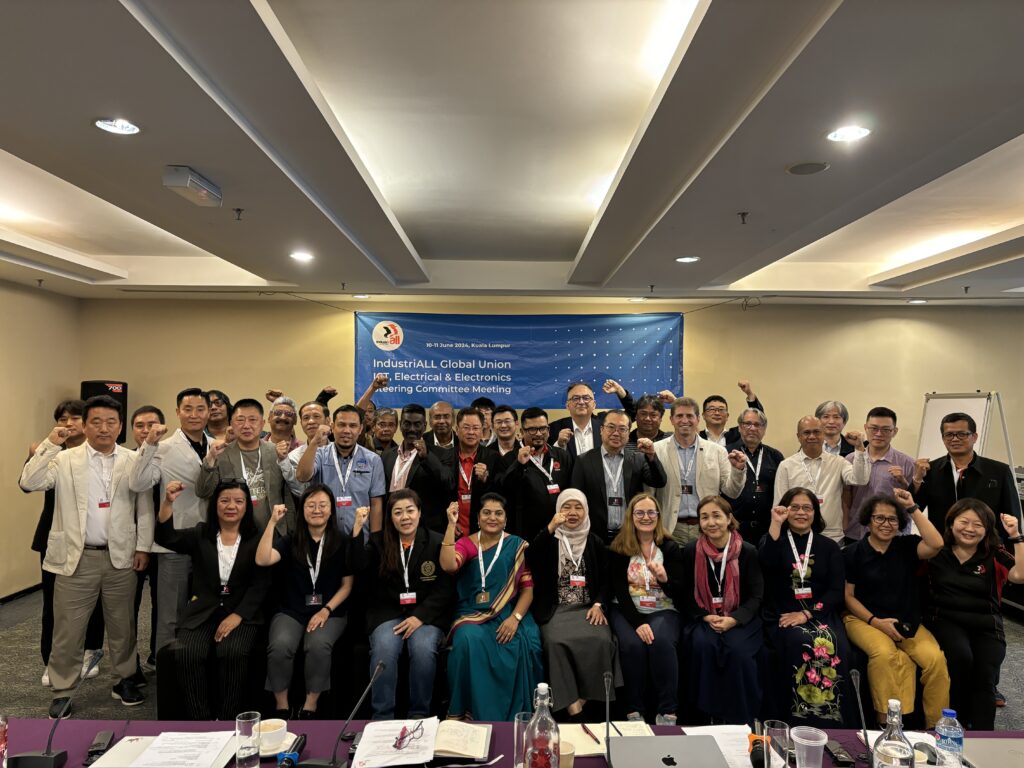Read this article in:
English
17 June, 2024IndustriALL Global Union ICT electrical and electronics steering committee pledges to double organizing efforts to defend workers' rights in the sector. The delegates from twelve countries met on 10-11 June in Kuala Lumpur to debate sectoral activities, focusing on organizing, increasing union density and improving collective bargaining rights. Delegates confirmed their unions’ continued focus to reach out to women, youth, white collar workers and organize them throughout the entire supply chain.
Malaysia’s Electronics Industry Employees Union Coalition continues to advocate for labour law reform including the revamp of the secret ballot formula, requesting over 50 per cent workers’ votes for union representation.
India’s Unions United focuses on organizing migrant workers, contract workers and young workers.
Thailand’s Confederation of Industrial Labour of Thailand (CILT) is campaigning for ratification of ILO Convention 87 and 98.
The Federation of Korean Metalworkers' Trade Unions (FKMTU) is calling union members to organize "100% workers at my workplace" and companies surrounding their workplaces.
IndustriALL assistant general secretary Kan Matsuzaki said:
"We must organize workers in the battery supply chain because we represent workers in the entire processes; mining, chemical, manufacturing and automotive sectors. It’s our responsibility to promote decent working conditions and build solidarity between unions across the sectors."
Participants expressed concerns that artificial intelligence (AI) has become an important driver of the ICTEE industry and manufacturing jobs might be replaced by AI as technological development might reshape the industry. MIT and Boston University estimate that two million manufacturing workers will be replaced by AI by 2025.
In March 2024, the Artificial Intelligence Act was adopted by the European Parliament, aiming to protect fundamental rights of European citizens, and to ensure AI technologies are safe, traceable and technology-neutral. The Act conceptualized three levels of AI threats – unacceptable risk, high risk, limited risk and minimal risk. Violation of the Act may be penalized up to 7 per cent % of a company's global annual sales amount.
ICTEE steering committee co-chair Masashi Jimbo said:
"Our sector is under pressure to respond to AI; we must find effective strategies to mitigate the impact of AI and digitalization. AI should not have a negative impact on our employment and working conditions. When the sector is growing, both companies and unions must protect jobs and provide reskilling training for workers."
The meeting also discussed occupational safety and health issues in the electronics sector. Samsung Electronics Group Union Solidarity (SEGUS) surveyed plants workers through the company unionized units. According to the study, Samsung workers suffer from musculoskeletal disorders, sleep disorder and depressive disorder.
A statement in solidarity with the strike of Samsung Electronics workers and the National Samsung Electronics Union’s sit-in action held on 7 June was adopted, with participants calling on Samsung Electronics to respect labour rights, cease repressing the trade union, and enhance fairness and transparency in the wage determination system.
